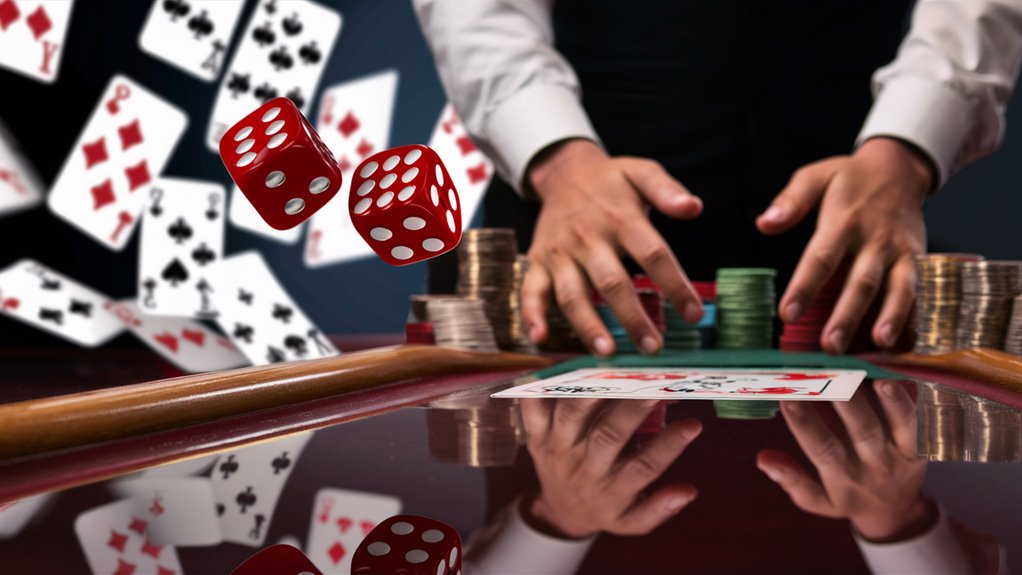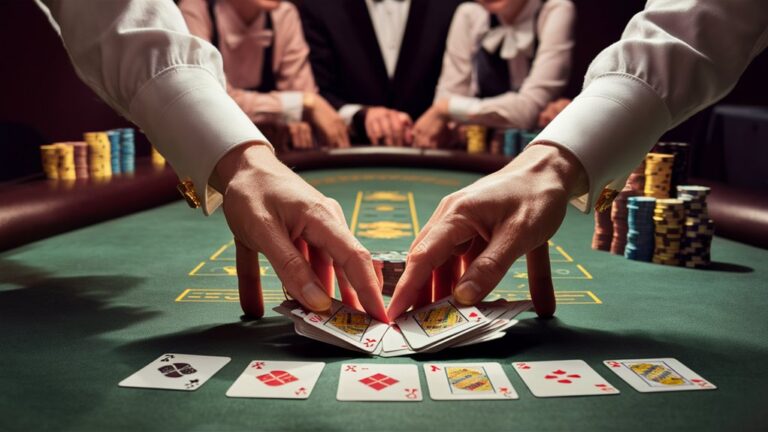
The Casino Game Probability
Blackjack and poker represent the peak of skill-based casino games. Under the right approach, strategy could significantly affect results.
Strategic Strength Casino Games
The peak of skill-based casino games are represented by blackjack and poker. With strategy playing into their winning or losing, not quite small outcomes can be much better influenced. This behavior makes the sheep-shanked player able to cut down the house edge at its floor of just 1%. A successful professional poker player will use the following skills: Statistical analysis, Probability-based decision-making, Strategy games. Get a fuller win than predicted. How to make money caring for cats. Gaining New Highs in Luck. Strategic considerations. Mathematical Edge. For your successful operation, do you know what kind of edge you have? It is these cash thresholds that somehow reconcile gain and discipline. In the long term, you should keep: Bankroll arrangement, Betting methods, Positioning for victory, Hedging against big losses.
Long-Term Success
To succeed, you must summon:
Improved knowledge of statistics
A strategy which has been disciplined
Emotions regulate themselves without the benefits
Recognition of patterns. Although luck influences success in casino games, such happenings allow for indicated model choice and strategic parameter optimization to favor accomplished players over those less able at life’s game.
A Mathematical Study of Entirely Protection Casino Games
Calculating slot machine probabilities
The Mathematics behind Casino Games
Casino games based entirely on luck are based on mathematically defined random events, where each event keeps hold of some upper or lower bound chances regardless of what has gone before. These games occur with strict probability distributions that stay constant no matter how a player behaves in them or what history them has loping each time.
Slot Machine Probability Analysis
The bedtime story comes from Random Number Generators (RNGs), the centerpoint of contemporary slot machines. With every spin, they create permanent lit running with actual randomness outlets. A simple three-reel slot machine has 20 symbols on each of its reels:
Total potential combinations: 8000 (20 x 20 x 20)
Each combination probability: 1/8000
The return-to-player (RTP) percentage determines long-term payback ratios.
Roulette Mathematics and Probability
The European Roulette Matrix is clearly one in that Verdant Vista Casino Perfect Probability Distribution: 37 figure stops (0-36). Individual figure luck: 1/37 $ 0.0273. House edge: Single number bets – 2.7%. Probability remains constant no matter how many times one measures it by previous examples.
Probability theory in dice games
Craps and other dice games as well adhere to the same kind of mathematical rules: Every possible pair of dice rolls has a fixed and certain probability. Obtainable odds by basic probability theory. House advantage relative to type of bet. Certainly independent result from one roll to the next every time each. This is why no matter what you throw down how – game factor is fixed equally likely for all variables under this mathematical system.
Poker players can reduce the house edge to less than 1% by using optimal basic strategy – a mathematically verified deviation recommended for each hand. Armed with these decisions, they maximize their winning probability through their play strategy. Look at the following breakdown detail by detail for advanced poker strategy players. Subtle psychological elements combine with the calculated figures in order to build a complex gaming environment: Pot odds, Implied odds, Expected value (EV), and analysis of an opponent’s behavior, betting patterns. Each such strategic decision by him, such as calling in, will change the game dynamic and probability matrix in some way.
Calibration of Strategic Performance
The tracking of relative performance in cards is equivalent to exact measurement of the skills differential. By comparing to basic strategy charts in a systematic way, the player can also judge q for every decision he or she makes. In blackjack strategy, even 0.1% to 0.5% of deviation from perfect odds will raise house edge; thus it provides a meter on an objective scale indicating how effective the player has been.
Mathematical Probability Analysis
Solve for the best strategy. Pattern recognition. Risk management. Statistical tracking. Understanding probability and statistics in gaming.
Core Mathematical Body of Knowledge
Probability theory is established as the essential mathematical framework for both analyzing casino games and making data-driven decisions. Through rigorous mathematical analysis, players strand precise odds and house advantages across various games.
Key terms such as expected value, variance, standard deviation provide the foundation for strategic wagering strategies.

Probability Calculations for Games
In probability calculations two things must both be understood: favorable outcomes and possible total outcomes. In standard card games, basic probs are:
Drawing an ace: 4/52 (7.69%)
Getting a blackjack: 32/663 (4.83%)
Multiple deck scenarios pile on even more layers of complexity.
After placing a bet in a game of sequential gamble gambling, conditional probability comes into play.
Statistical Analysis and Long-Term Results
The law of large numbers demonstrates how actual results will converge with theoretical probabilities over long-run play time periods. This principle of probability theory spells out why:
Short-term results may fluctuate greatly.
Long-term results match real performance with mathematical recommendations.
Data-driven thinking leads to heavier gains than betting on emotion.
Statistical variance has an impact on short-term fluctuations.
Psychology Of Gambling
The Psychology of Gambling: Understanding Risk and Reward
Cognitive Biases in Gambling Activities
Having an understanding of the psychological grounding of gambling behavior really is important. It is mainly a matter of interfaces between cognitive preferences, emotions and rational considerations, although these combinations are impalpable.
Therefore, there is some probability that just as they attracted to the gambler’s fallacy means people can propel when followed by a few rounds of failure into predetermining themselves for victory. It may seem statistically unlikely but gamblers often link their losing streaks with Flickering Ember Blackjack profitable events, irrational though that may be.
Loneliness of loss, loneliness of gain
Even after more than 10 years of terra firma, loss chasing still remains the focus of much research. Work in the field so far shows intuitively that prospects for gains are much less important than prospects for loss. Loss sequences alone cause roughly twice the psychological impact to be felt by an individual gambler as do the exact amount of earnings lost. This principle of psychological education explains why gamblers will typically increase their stakes after losing $100 as opposed to quit or even out.
How Psychological Mechanisms Influence Decision-Making
When making a decision in gambling, your chances of winning are higher if you believe that you will win, whereas if you let forgetfulness or other negative influences get hold of this idea and encourage them, then suddenly winning becomes almost impossible. Players generally remember their winnings clearly after the fact but losses vaguely, which means many times we look back on your stakes and think has been such a great day indeed at the table it may well be worth my while to go There again tomorrow or Monday. This is particularly true for losers who begin thinking negative self-evaluations as an incentive to gamble on.
By manipulating gamblers’ normal thoughts and feelings, casinos are able to make the games they offer at one or more levels of monopoly Tobacco Co. unavoidable who but those with different mentality than the average person cannot help but begin betting time after time until either house price goes down enough so that an equal opportunity game becomes possible where advantage will finally swing back again for participants on this side.
Risk Factors and Behavioral Model
The interaction between dopamine and the internal environment of a person becomes an important factor that determines whether he may be vulnerable to addictive behaviors or not. This principle — which emphasizes the relationship between vulnerability factors within one’s body and surrounding social environment– has been confirmed in numerous psychological studies. 먹튀검증
How To Manage Your Money For Success
Making proper use of the strategic bankroll is necessary for all people who love money, because without it, their cash will evaporate in a short time.
A good money management strategy leads to guaranteed success, but most people begin to experience declining fortunes before they can even see themselves as rich. This is what happens to 70% of those who have earned and lost money in a casino–the cause being their poor money management practices.
Someone who has mastered the art of mathematical probability and strategic allocation in investment requires no further protection than that.
Implementing Risk-Management Systems
The bedrock of good financial planning lies in a disciplined division of your bankroll.
Create a unit-based system to protect capital by limiting exposure to 2-3% per bet.
For example, if you have $1,000 and are investing it, let individual positions be from $20-30. This way of risk management will give you nearly 95% of market normals as protection against risk–normal market volatility.
Setting Clear Boundaries & Objectives
Write clear risk parameters by which one’s trading day is conducted:
20% maximum drawdown per session.
30% profit target threshold.
Once the exit or take a technology is reached either–Such disciplined approaches to the development of technology stave off irrational decision-making and can avoid fortunate or huer- behaviors such as chasing losses through recovery. If this is done in transactions state de that at time each month 83% of those involved receiving scores will know what happened with future income.
Performance Tracking & Analysis
Keep detailed records of all transactions:
When you enter or exit a position.
Whether you have won or lost on a transaction.
Identifying the pattern.
Return in profits and losses on your investment.
According to system data analysis, let strategy performance optimized based on measurable results, rather than with a feeling in your bones or by following gut instincts. This evidence-based methodology of continuous improvement allows for informed pedestrians to adjust their position sizing and risk management protocols.


